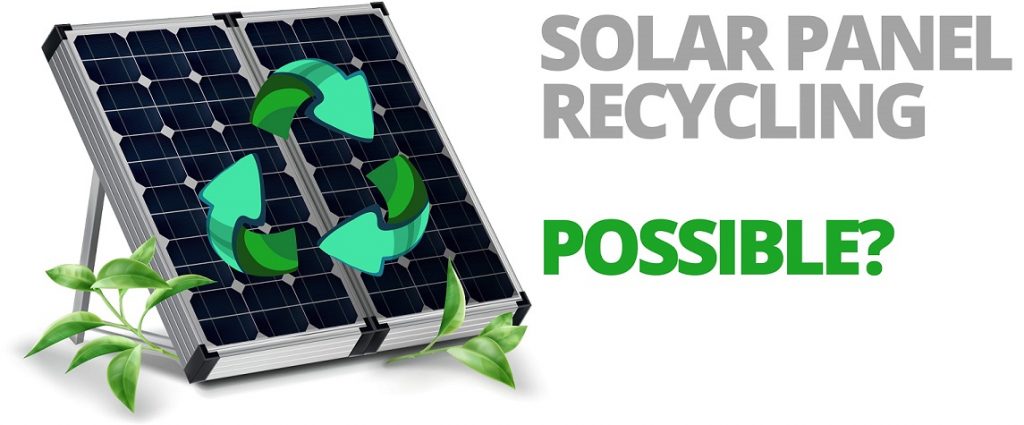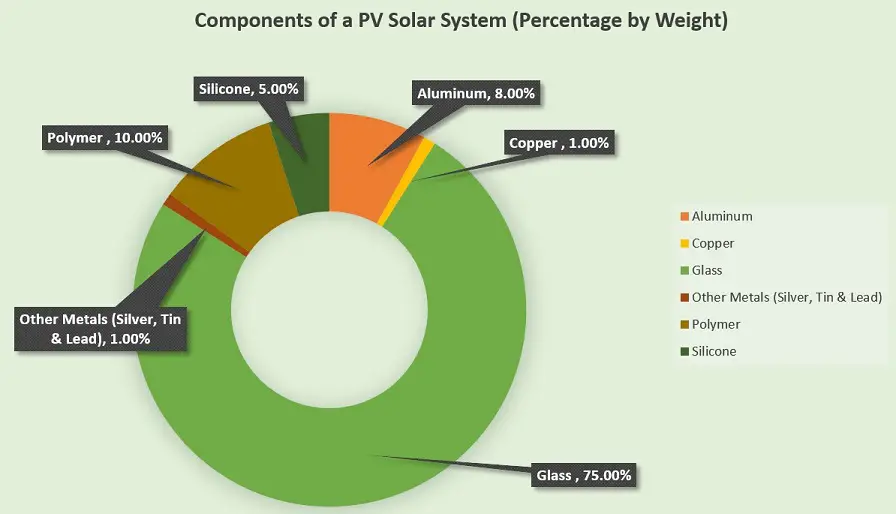Is it possible to recycle solar panels?

Solar panels can be recycled, but there is a catch to it. The solar cells are made of silicon wafers and other semiconductors, which makes them difficult to recycle with regular recycling methods.
Each component should be separated from the others and disposed of appropriately.
The components that make up solar panels should be sorted by type, before being sent to a recycling center for destruction.
Because there can still be hazardous substances such as lead-tin on some surfaces, caution must always be exercised during this sorting process so no contamination occurs.
Also, solar power systems have components other than PV panels. For example, inverter, batteries, infrastructure, and another electrical wiring.
These are all potential sources of recycling material. However, in this post, we will only focus on solar panels, and how are they recycled when they reach their end of life.
What are solar panels made of?
Solar panels are mostly made from recyclable materials. Components like glass and certain metals make up about 75% of their mass and they can be easily recovered. Polymers, metals, and electronic components may be recycled as well.
The below chart shows components that make up a PV system in percentage by weight.
Please keep in mind, the numbers in the chart are not exact values. Solar PV model weight composition will differ depending on the make and model of the equipment.

Solar panels are made of a number of different components.
Glass
Glass makes up a significant portion of solar panels and it is 100% recyclable, to be turned into new glass products like windows or new solar panels.
Metals
Metals make up another major portion of a solar PV composition, wiring as well as mounts.
Steel and aluminum are the most common metal components and can be easily recycled. There are many other metals in use but they vary depending on the system.
Polymers
Polymer is a type of plastic that makes up some parts inside solar panels (such as connectors) and has many other applications outside of PV systems like computers, smartphones, televisions, etc.
Plastic recycling happens on an industrial scale where it can be ground into pellets which are then used for manufacturing plastics again without any loss of quality.
Silicone
Silicone is an important component in solar panels because it's used as a sealant between the glass and aluminum frame of the PV.
Silicones are not always recyclable, but degraded silicone can be recycled into other materials that have similar properties to silicones, such as caulks or sealants.
Electronic Components
Electronic components may also be recyclable depending on the specific component.
However, due to electronic waste being a major environmental hazard, it is typically recycled by specialist recycling companies that are able to handle and dispose of hazardous materials.
 “DSC00379” by baselactionnetwork is licensed under CC BY-ND 2.0
“DSC00379” by baselactionnetwork is licensed under CC BY-ND 2.0
Why to recycle solar panels?
There are many good reasons why to recycle solar panels.
Eliminates Need for Virgin Materials
Recycling solar panels reduce the need for mining and manufacturing new materials.
Recycling reduces the amount of pollution and landfills in our environment by reducing the demand for raw materials such as aluminum, copper, glass, and plastic.
Some solar panels contain toxic substances like cadmium or lead which are potentially hazardous to both humans and animals if they were disposed of improperly so it is very important to recycle solar panels.
New recycling technology has made it easier and cheaper for manufacturers to extract these materials from old products, which in turn makes them more available for reuse in the manufacturing process.
Reduces energy use for solar panel production
It takes a lot of energy for companies to produce new cells, but recycling reduces that cost substantially.
Recycling also helps reduce greenhouse gas emissions, which are a major contributor to climate change.
The problem with recycling any product (solar or not) is potential health hazards like lead and cadmium pollution in landfills due to improper disposal which is why it's important to dispose of your panel properly.
Creates new jobs
Solar panel recycling can help create jobs in this growing industry.
The Problem with Recycling Solar Panels
There are two primary concerns in recycling solar panels: the environmental impact of creating new cells, and the health risks associated with improper disposal.
The first concern is fairly straightforward: it takes a lot more energy to create new cells than to recycle old ones.
This creates an issue for companies that want to reuse materials from old products but can't find ways to extract these materials without using more resources than they're saving by doing so.
There's also some potential for toxic emissions during production because different methods use different types of chemicals or have other high-energy processes (think smelting).
These pollutants could be released into the air and water if recyclers aren't careful about how they handle the waste.
The second concern is a little more complicated: recycling solar panels might not be as safe for people as we think it is.
There's no shortage of news articles on toxic substances in our environment, and many contain troubling facts about how these substances can be released from recycled materials-sometimes when they're still being broken down or put together into new products!
Concerns range from arsenic poisoning to mercury pollution, but there are also plenty of documented cases where recyclers have been cautioned against disposing of hazardous wastes improperly.
Many states ban the public sale of used electronics that were made of certain materials.
How does solar panel recycling works?
The first step to recycling solar panels is a process called “de-panelization”. This is the removal of all electrical components from the panel.
Once this has been completed, it's then important for any potentially toxic substances to be removed and disposed of properly.
After that, each individual component will need to undergo its own de-processing in order to return them back into usable materials or energy sources.
For example, lead-acid batteries can't just be tossed into a huge container together with other types of metals.
They'll contaminate everything else before anything productive happens. Eventually, after being broken down even more on an atomic level, these recyclable parts are turned into new products such as steel.
What is the current state of solar panel recycling?
There are many methods being researched to recycle solar modules. There is a lot of effort around the world to come up with new ways to reuse old PV panels in order to reduce their environmental impact and recover some value from them.
Existing recycling techniques can only recover a portion of the material, so there is an opportunity to do more.